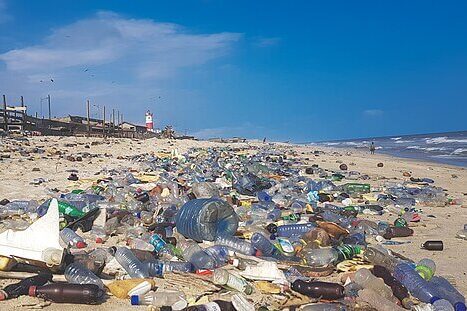
The UN talks — the sixth round in less than three years — dragged on beyond their deadline as countries negotiated late into the night in an effort to break the deadlock.
At the heart of the impasse is a divide between around 100 nations pushing for limits on plastic production, and oil-producing states pressing instead for a treaty centred on recycling.
Speaking in the early hours, Cuban delegates said countries had “missed a historic opportunity, but we have to keep going”.
“I’m hugely disappointed that an agreement wasn’t reached,” said the UK’s Marine Minister Emma Hardy.
“Plastic pollution is a global crisis that no country can solve alone, and the UK is committed to working with others at home and abroad to protect the environment and pave the way to a circular economy,” she added.
The negotiations were launched in 2022 in response to mounting scientific evidence of the dangers plastic poses to human health and the environment. While plastics are used across almost every sector, scientists warn that they release potentially toxic chemicals as they degrade into smaller fragments. Microplastics have now been detected in soils, rivers, the atmosphere — and even inside the human body.
An initial deadline to finalise a deal by December last year was already missed, and the collapse of this latest round leaves the process further behind schedule.
Speaking on behalf of the island states, the northern Pacific nation of Palau said on Friday: “We are repeatedly returning home with insufficient progress to show our people.”
“It is unjust for us to face the brunt of yet another global environmental crisis we contribute minimally to,” it added.
The central fault line has remained unchanged: whether to reduce plastic at source by cutting production, or to focus on managing waste after it has been created.
For major oil-producing states such as Saudi Arabia and Russia, plastics — derived from fossil fuels — are seen as critical to future economies as global demand for petrol and diesel falls with the rise of electric vehicles. They argue that investment in waste collection and recycling infrastructure is the most effective solution, a stance supported by many producers.
“Plastics are fundamental for modern life – they go in everything,” said Ross Eisenberg, president of America’s Plastic Makers, a trade association for the plastic production industry in the United States.
“Focusing on ending plastic pollution should be the priority here, not ending plastic production,” he added, warning that attempts to substitute plastics with other materials could lead to “unintended consequences”.
But scientists and campaigners say this approach is inadequate, noting that global recycling rates remain at only around 10%, with little room for improvement.
“Even if we manage to boost that over the next few decades to 15, 20, 30%, it would remain a substantial amount that is polluting the environment and damaging human health,” said Dr Costas Velis, associate professor in Waste and Resource Engineering at Imperial College London.
“Therefore, we do need to improve recycling… but we cannot really hope that this is going to solve all the aspects of plastic,” he added.
Plastic production has surged from 2 million tonnes in 1950 to 475 million tonnes in 2022, and is projected to continue rising without new restrictions.
The UK, EU and about 100 other countries had pushed for a treaty that includes production caps and harmonised global design standards to improve recyclability. Proposals included requiring bottles to be manufactured in a single colour, as dyes reduce their resale value compared with clear plastics.
This approach was also backed by major consumer goods companies such as Nestlé and Unilever, part of the Business Coalition led by the Ellen MacArthur Foundation. The group has urged governments to introduce extended producer responsibility schemes, whereby small levies on plastic products fund recycling systems — a move they estimate could double revenues to $576bn (£425bn) by 2040.
Although the chair of the talks, Ecuador’s Luis Vayas, issued a revised draft text seen as closer to the UK and EU position, it stopped short of calling for limits on production. Instead, it encouraged countries to adopt national measures addressing hazardous chemicals and the design of plastics for easier recycling.
Speaking at the final meeting, the EU delegation said: “We see the outcome of this session as a good basis of future negotiations.”
Oil-producing states expressed strong opposition. Saudi Arabia described the negotiating process as “problematic”, while Kuwait complained that its views had not been reflected.
Environmental groups reacted angrily to the failure, accusing oil states of putting profits ahead of planetary health.
Graham Forbes, Greenpeace head of delegation to the Global Plastics Treaty negotiations, said: “The inability to reach an agreement in Geneva must be a wakeup call for the world: ending plastic pollution means confronting fossil fuel interests head on.
“The vast majority of governments want a strong agreement, yet a handful of bad actors were allowed to use process to drive such ambition into the ground.”
The chair confirmed that the negotiations will reconvene at a later date.
——————————————————————————
At Natural World Fund, we are passionate about restoring habitats in the UK to halt the decline in our wildlife.

